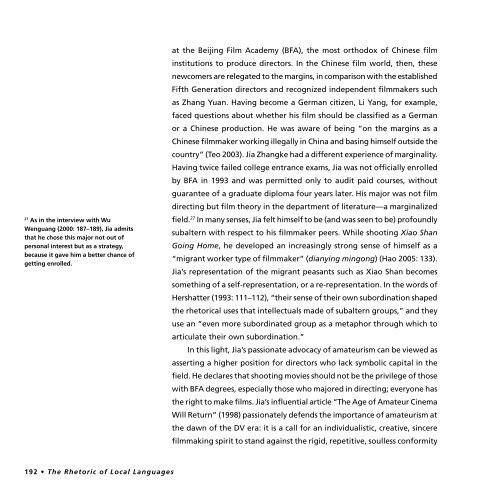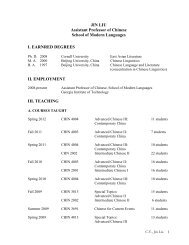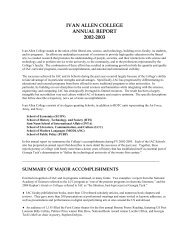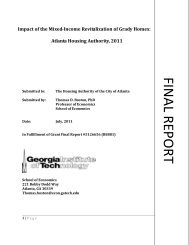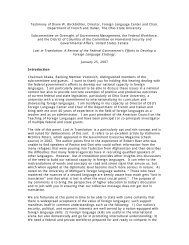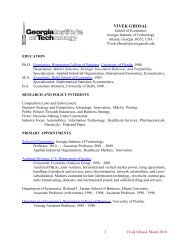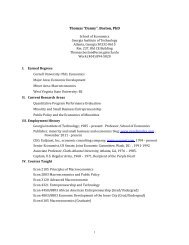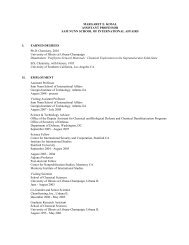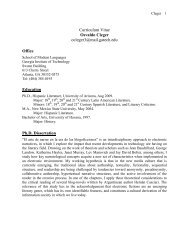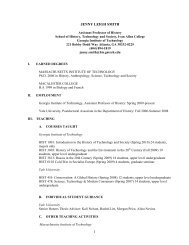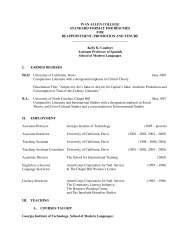Read this paper
Read this paper
Read this paper
Create successful ePaper yourself
Turn your PDF publications into a flip-book with our unique Google optimized e-Paper software.
27<br />
As in the interview with Wu<br />
Wenguang (2000: 187–189), Jia admits<br />
that he chose <strong>this</strong> major not out of<br />
personal interest but as a strategy,<br />
because it gave him a better chance of<br />
getting enrolled.<br />
at the Beijing Film Academy (BFA), the most orthodox of Chinese film<br />
institutions to produce directors. In the Chinese film world, then, these<br />
newcomers are relegated to the margins, in comparison with the established<br />
Fifth Generation directors and recognized independent filmmakers such<br />
as Zhang Yuan. Having become a German citizen, Li Yang, for example,<br />
faced questions about whether his film should be classified as a German<br />
or a Chinese production. He was aware of being “on the margins as a<br />
Chinese filmmaker working illegally in China and basing himself outside the<br />
country” (Teo 2003). Jia Zhangke had a different experience of marginality.<br />
Having twice failed college entrance exams, Jia was not officially enrolled<br />
by BFA in 1993 and was permitted only to audit paid courses, without<br />
guarantee of a graduate diploma four years later. His major was not film<br />
directing but film theory in the department of literature—a marginalized<br />
field. 27 In many senses, Jia felt himself to be (and was seen to be) profoundly<br />
subaltern with respect to his filmmaker peers. While shooting Xiao Shan<br />
Going Home, he developed an increasingly strong sense of himself as a<br />
“migrant worker type of filmmaker” (dianying mingong) (Hao 2005: 133).<br />
Jia’s representation of the migrant peasants such as Xiao Shan becomes<br />
something of a self-representation, or a re-representation. In the words of<br />
Hershatter (1993: 111–112), “their sense of their own subordination shaped<br />
the rhetorical uses that intellectuals made of subaltern groups,” and they<br />
use an “even more subordinated group as a metaphor through which to<br />
articulate their own subordination.”<br />
In <strong>this</strong> light, Jia’s passionate advocacy of amateurism can be viewed as<br />
asserting a higher position for directors who lack symbolic capital in the<br />
field. He declares that shooting movies should not be the privilege of those<br />
with BFA degrees, especially those who majored in directing; everyone has<br />
the right to make films. Jia’s influential article “The Age of Amateur Cinema<br />
Will Return” (1998) passionately defends the importance of amateurism at<br />
the dawn of the DV era: it is a call for an individualistic, creative, sincere<br />
filmmaking spirit to stand against the rigid, repetitive, soulless conformity<br />
192 • The Rhetoric of Local Languages<br />
MCLC 18.2.indd 192<br />
12/20/06 2:01:39 PM


